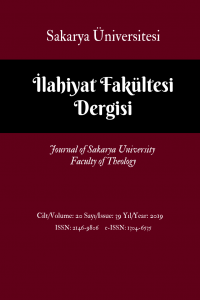Tefsirde İhtilaf Karşıtı Söylemin Tahlil ve Tenkidi
A Critical Approach to the Discourse against Disagreements of the Qur’ānic Exegesis
Author(s): Bayram DemircigilSubject(s): Islam studies
Published by: Sakarya üniversitesi
Keywords: Qur’ānic Exegesis; Companions; Disagreements; Variance; Substantive disagreements;
Summary/Abstract: Qur’ānic exegetical disagreements among commentators have been existing along with the his-tory as a natural phenomenon. But they had been subject to being restricted or presented as detrimental by Ibn Taymiyyah (d. 728/1328) and his followers. They argue that disagreements among exegetes should be classified under the forbidden disagreements according to the Qur’ānic verses and Prophet’s sayings as well as the characteristics of exegetical disagreements among his companions. However, this evidence from the Qur’ān and the hadiths which portray disagre-ements as harmful and evil could not include disagreements on scientific issues. The reason behind the derogatory language used for disagreement in the Qur’ān and the hadiths is to prevent Muslims from being divided. Consequently, the exegetical disagreements among companions co-uld not be simplified by reducing them to disagreement of variance (i.e.ikhtilaf al-tanawwuʽ). Because there had been among the companions of the Prophet some substantive disagreements amounting to contradiction (i.e. ikhtilaf al-taḍad). But in fact, Ibn Taymiyyah’s approach could not be reconciled with reality and scientific freedom. Besides, it reduces the Qur’ānic interpreta-tions to preoccupation with narrations from salaf (the first three generations of the Muslim com-munity). In this article, we will investigate the basics of this viewpoint. We also discuss whether the provided evidence matches Ibn Taymiyyah’s theory.
Journal: Sakarya Üniversitesi İlahiyat Fakültesi Dergisi (SAUIFD)
- Issue Year: 21/2019
- Issue No: 40
- Page Range: 441-468
- Page Count: 28
- Language: Turkish

